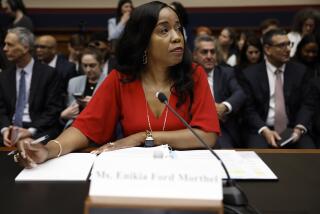NORTH HOLLYWOOD : Lemons Give Youths a Taste of Stereotyping
- Share via
When the students at Lankershim Elementary School finished with Margaret Challgren’s lemons Monday, there wasn’t a sour face in the class.
Challgren brought the lemons on her visit to the North Hollywood school as part of a new, anti-bias pilot program designed to sweeten attitudes toward classmates of different ethnic or cultural backgrounds.
With a student body predominantly Latino but hosting an influx of black students, school officials had requested the program to address diversity in a positive manner, Principal Sue Shannon said.
Monday’s lesson was on stereotyping. Challgren, who visited several classrooms from third to sixth grades, brought a basket of lemons.
First, she asked the students to describe a lemon, receiving suggestions such as “sour,” “yellow,” and “oval”.
Then Challgren asked the students to identify a single lemon. By pointing out scars, shapes and other surface features, the students got a taste of individuality in groups.
“When we forget about each person being an individual and start lumping them together, that’s what we call stereotyping,” Challgren explained to students in Marti Julian’s sixth-grade class. “The worst part about stereotyping is that it can lead to prejudice, and it can lead to racism.”
The message was not lost on Julian’s students, some who said they have been victims of prejudice and stereotyping at the school.
Denise Marroquin, 12, said she has been told that she eats only beans because she was born in Guatemala.
“It’s true, I do eat beans. But that’s not all I eat,” Marroquin said.
Challgren emphasized that students use words like “some” and avoid words like “every” and “all” when describing a group of people.
The eight-week program, organized by the Camp Fire Council in Panorama City, is also being tested at Vaughn Street School in San Fernando. It includes lessons on confronting prejudice, resolving conflicts and valuing others. The program is free to the schools and, if successful, could be implemented in other schools as early as next fall.
Kelly Ferguson, a 12-year-old girl, appreciated the lesson.
“It was a good example,” Ferguson said. “It makes people really think about what they say and they realize that what they say is bad.”
More to Read
Sign up for Essential California
The most important California stories and recommendations in your inbox every morning.
You may occasionally receive promotional content from the Los Angeles Times.













